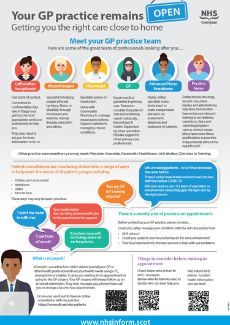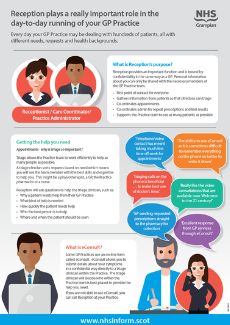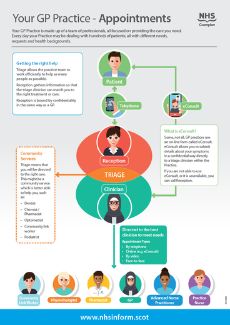Primary Care – getting the help you need
![]()
Every day GP Practices are seeing hundreds of patients all with different needs, requests and health backgrounds.
New ways of working have been introduced and consultations are offered in a range of ways to best meet the individual needs of each patient depending on what they are seeking an appointment for, and to help practices to see as many patients as possible each day.
Why can’t I get an appointment with my GP?
GPs are seeing patients, in fact they are busier than ever. There is a higher level of demand and need than ever before.
GPs operate as part of a wider team of health specialists, both within the practice and the community, who work together to help people get the care they need as quickly as possible.
Your GP is not always the most appropriate person to help you and through the triage process, you will be directed to the healthcare professional best placed to help you, which may include community healthcare professionals such as the community pharmacy or dentist.
Why am I passed to someone else when I want to see my doctor
Most Practices have a number of healthcare specialists as part of their team, they are able to make referrals in the same way as your GP. The Practice works closely as a team and support each other to look after their patients.
General Practitioners are expert medical generalists in primary care. They are trained to consider the patient’s care and wellbeing needs holistically, beyond just ill health. GPs also provide support to other primary care professionals. It is sometimes more appropriate for patients to have a consultation with a specialist who can provide the required assessment and help, such as a dentist or community pharmacist.
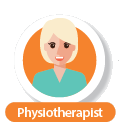 |
Physiotherapists specialise in helping people affected by injury, illness or disability through movement and exercise, manual therapy, education and advice. |
 |
Pharmacists provided specialist advice on medication. They liaise with community pharmacies to manage repeat prescriptions. They also can support patients in managing chronic conditions. |
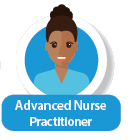 |
Advanced Nurse Practitioners are highly skilled specialist nurses. They are authorised to make independent decisions on assessment, diagnosis and treatment of patients. |
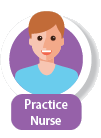 |
Practice Nurses’ duties include dressings, wound care, minor injuries and administering injections. Nurses often have enhanced roles and training to run diabetes, respiratory clinics and screening programmes such as cervical smears. Many practice nurses have minor illness qualifications to prescribe independently without the need for a GP. |
Other professionals include physician associates, paramedic practitioners, link workers and clinicians-in-training.
What is triage?
Every day your GP practice may be dealing with hundreds of patients all with different needs, requests and health backgrounds. Triage allows the practice team to work efficiently to help as many people as possible.
A triage clinician, supported by Reception, sorts requests based on need which means you will see the team member with the most appropriate skills and expertise to help you.
Some practices, but not all, also use an online system called eConsult. eConsult submissions go directly to the triage clinician, but if you are not able to use eConsult, Reception will ask you some questions to help the triage clinician decide who is best placed to help.
Reception provides an important function and is bound by confidentiality in the same way as a GP. Personal information about you can only be shared with the necessary members of the GP practice team.
What type of appointments are available at GP practices?
Patient consultations take place in a number of ways to meet patients’ needs and to help practices to see as many patients as possible.
The triage clinician, with the help of reception, sorts appointment requests so that patients consult with the professional with the most appropriate skills and expertise to help. This is done in a number of ways such as by telephone, online (for example eConsult), by video call or face-to-face. You may be directed to a community practitioner, such as a community pharmacy or dentist if they are more appropriate to help you. Your medical records are updated each time you have an appointment in the practice and consultation notes are kept together so your GP will be kept informed of your consultations.
What is eConsult?

Some, but not all, GP practices use an online consultation tool called eConsult. eConsult is software that allows you to quickly and safely get help and advice from your own doctors and GP practice online. If you are not able to use eConsult, or it is not available at your GP practice, you can call Reception in the usual way.
eConsult is a form-based online consultation and triage platform that collects your medical or administrative request, such as a repeat prescription, and sends it through to your GP practice. The online form lets you tell your GP or other health professional about your health needs using a personal computer, smartphone or tablet at a time that is convenient to you. It also saves you waiting for an appointment or going the GP surgery.
eConsult lets you explain in your own words what you want help with by asking questions that give the clinician the required information in an easy to read format which allows quick but appropriate decision making. The questions are designed to advise you if you need to seek more urgent help. Your surgery will always follow up an eConsult submission. They may message you, phone/video call you or arrange a face-to-face appointment. As all your answers are recorded in the form, the eConsult process has strong governance around reasons for decision making.
You can also use it to have an online consultation with the practice. https://econsult.net/nhs-patients
Find out more about how to use eConsult: https://econsult.net/nhs-patients/how-to-use-econsult
Who to turn to when you need help
These NHS websites can provide advice and support:
- NHS Grampian - Know Who To Turn To
- NHS 24
- NHS inform - Scottish health information you can trust
- NHS Pharmacy First Scotland
Daytime hours:
- Your community pharmacy/chemist/optometrist
- Your GP practice
Out of hours:
- For urgent, but not life threatening situations, call NHS24 on 111
- In an emergency, always call 999
Resources
|
Your GP Practice remains open (pdf)
|
Reception plays a really important role in the day-to-day running of your GP Practice (pdf) |
|
Getting the Care You Need from Your GP Practice - Patient Journey (pdf)
|
|

